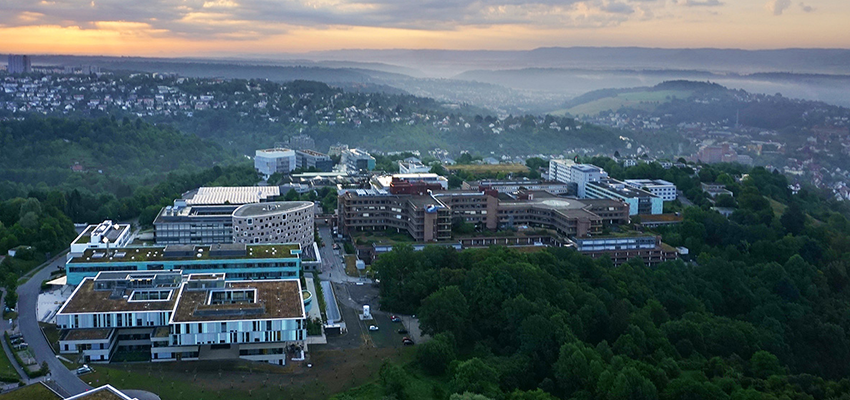Karriere
am Klinikum & Medizinischer Fakultät
PhD Student (f/m/d)
University Hospital of Tübingen, M3 Institut, index number 6284


 Part-time
Part-time65 %
 Limited:
Limited: 3 years
 Start of work:
Start of work:as soon as possible
 Application deadline:
Application deadline:04.08.2025
We are offering a PhD project position as part of a translational cancer research funded by the Robert-Bosch-Foundation. This project aims to elucidate the interactions between gut microbes and their metabolites with the immune system in cancer immunotherapy. We will focus particularly on genetically re-engineered CAR-T cell therapy that specifically target cancer cells (e.g., CD19-CAR-T cells against lymphomas) as the the lab has a long-lasting interest in studying microbe – immune cell interactions in CAR-T therapy (e.g., Stein-Thoeringer et al., Nature Medicine 2023).
All research will be carried out in the M3 (Mikrobiom-Metabolom-Malignom) – Institute at the University of Tübingen and will include the following topics (but not restricted to):
- CAR-T cell engineering with designing and validating microbial-responsive CAR vectors
- In vitro and In vivo models; from cell to laboratory animal work with CAR-T cells
- Microbe – metabolite – cell co-culture experiments
- Advanced immune cell flow cytometry and cytokine analyses
- Multi-omics data integration (microbiome, metabolome, gene expression, immune phenotypes etc.) to identify potential host-microbiome interactions
The project will be carried out in close supervision and mentoring by the lab head and senior postdocs.
For further information also check our homepage:
- Highly motivated and interested in the fundamental mechanism of the gut microbiome, infection, cancer and translation of laboratory finding into perspective clinical applications
- Master degree in microbiology, biochemistry, molecular biology or biotechnology; completed with honors or equivalent academic distinction
- Previous experimental experience in animal model research, basic molecular biology, immunology and cell culture techniques
- Fundamental statistical and computational skills (preferential) and an interest to broaden the use of computational methods for high-dimensional data analysis
- Confident communication in English (written and spoken), B2 level or higher
- Team-working abilities are essential
- Critical independent thinking is encouraged
- The successful candidate will develop excellent experimental, communication and presentation skills, and will be familiarized with a high performing scientific environment that gives an advantage for career development in both academia and industry
Benefits
- Work in the diverse environment of a modern university hospital, which, in addition to patient care, also focuses on medical research and teaching
- Future-proof job and location, as well as attractive remuneration including a company pension plan (VBL), with the greatest possible flexibility in working hours
- Subsidy for public transport tickets and attractive discounts on our employee service platforms
- Structured onboarding phase, hospital-owned academy for developing professional, social, and methodological skills
- Preventive health care through a wide range of sports activities
The Lab of Translational Microbiome Research (Head: C. Stein-Thoeringer), part of the Cluster of Excellence “Controlling Microbes to Fight Infections” (CMFI), at the University of Tübingen studies the cross-talk between gut microbes, pathogens, the immune milieu and environmental factors in cancer development, therapy and infections. The lab’s science mission is to understand how individual bacteria, microbial consortia or microbial perturbations through diets or antibiotics interplay with inflammatory responses and metabolic disturbances to drive carcinogenesis and metastasis in preclinical models. We also study the longitudinal cross-talk of cancer therapies with the gut microbiota to investigate causal relations, e.g., by direct bacterium-host cell interactions or via microbial metabolites.This research is done in a perpetual dialogue between preclinical research and clinical studies.
We are using cutting-edge wet-lab techniques combined with bioinformatic tools to sequence and to analyse the microbiome from different sites of the gastrointestinal tract applying culture-omics and high-resolution metagenome sequencing techniques. This approach is combined with multi-omics characterisation of the host’s immune system or the metabolome, and we utilize cell culture models and also qnotobiotic model systems to infer causality in microbe-host interactions. In translational clinical approaches, we are performing clinical studies to study patient microbiomes, associations with disease and environmental factors and carry out microbiome-based interventions for the benefit of patients.
Index number: 6284
Including CV and cover letter
Application deadline: 04.08.2025


.png)

.png)




